How Governments Around the World Have Tackled Post-Pandemic Mental Health Among Young People

As the severity of the COVID-19 pandemic has largely waned, the emergence of a potential mental health crisis has commanded increasing attention. Across the world, policymakers have looked for new and expanded ways to support mental well-being.
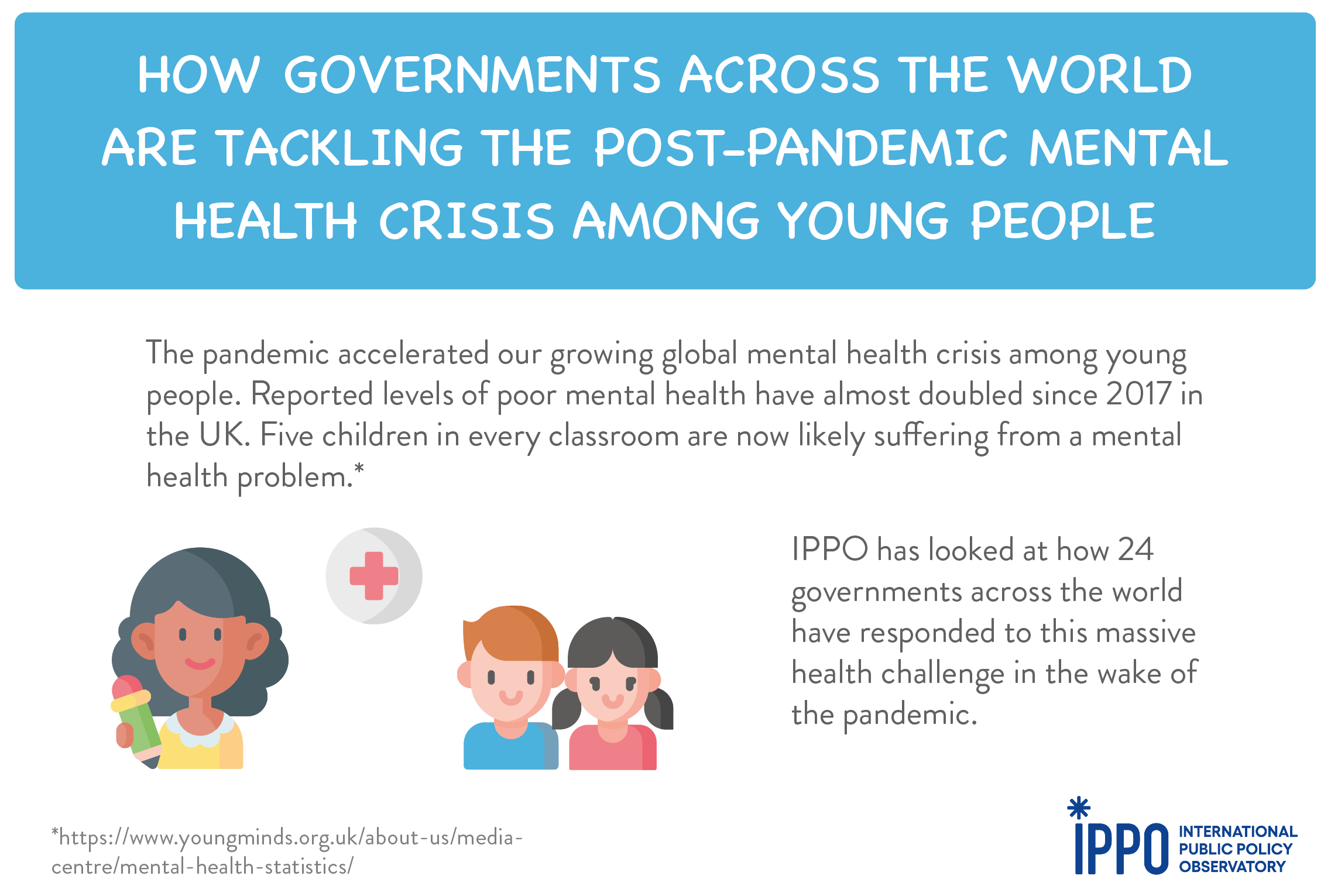
The World Health Organization highlights an estimated 25% rise in both anxiety and depressive disorders measured in just the first year of the pandemic – an increase which it notes has compounded the existing shortfall of services to adequately meet the growing demand for mental health treatment.
One area of focus has been the specific impacts on children and young people, many of whom faced significant interruptions to their educational and social lives. IPPO has looked extensively at youth mental health since the pandemic’s onset, including as part of a systematic review released in November 2022 examining ‘effective, scalable interventions’ at the population level.
We wanted to examine the range of recent policy interventions that governments have either newly announced or implemented in response – specifically those which benefit children and young people.
Policy information was collected from 48 countries over a period of three weeks with help from the volunteer contributor base of the Oxford COVID-19 Government Response Tracker (OxCGRT). In part, we wanted to see if and how these policies aligned with the findings of the IPPO Systematic Review, yet we also captured policies that do not align with these previous findings but which would still be available for children and young people to access. Though not an exhaustive list, we have collated the policies captured in the scan into seven areas of focus:
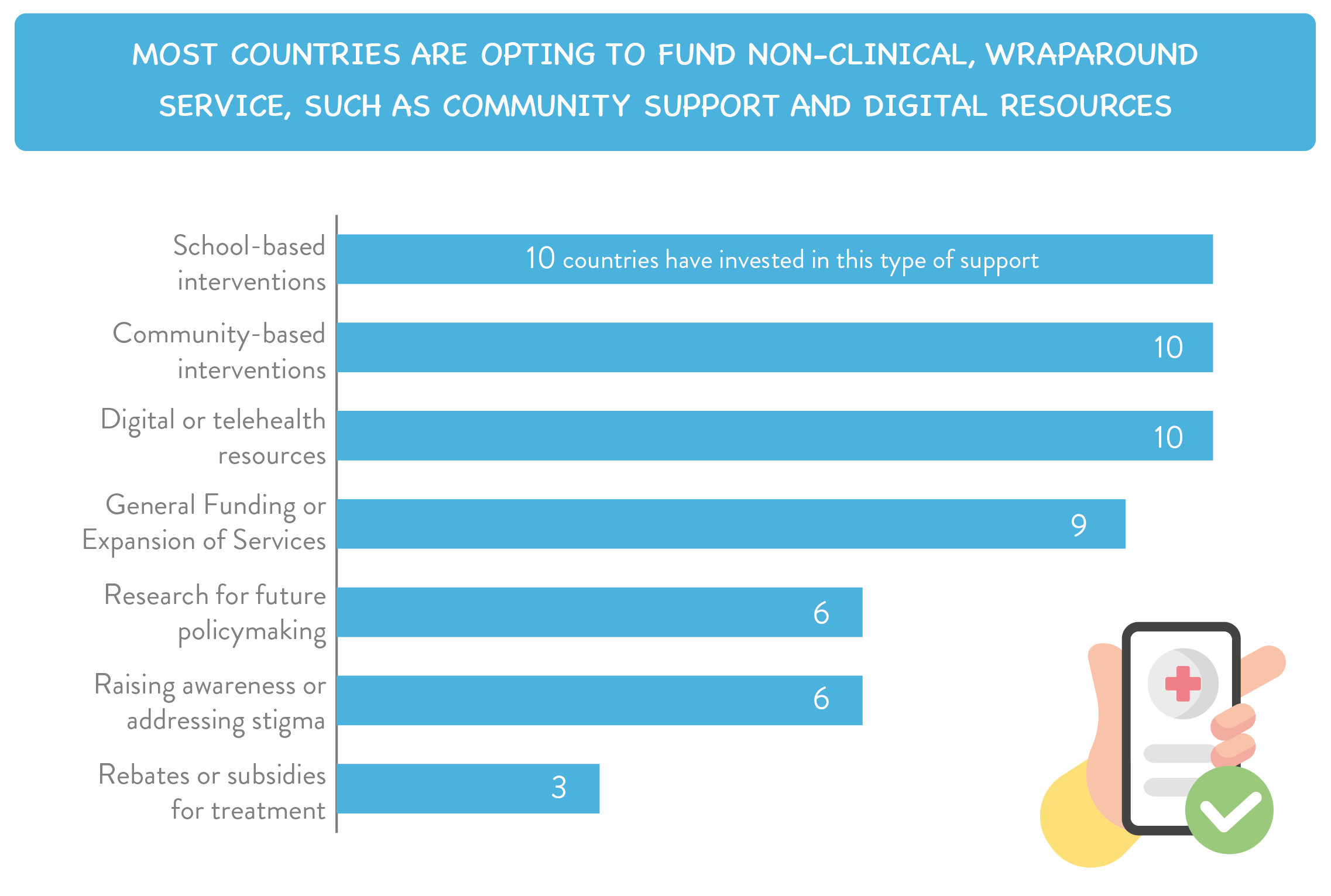
Overview of the Findings
Overall, we find that many governments have progressively recognised the need for expanding available support to address the mental health crisis, even in countries that have not implemented formal policies. Several governments included in the scan have indeed poured significant funding into efforts to expand access to mental health and well-being services – some as part of a synthesised approach within multi-year action plans.
Whereas our previous policy scan on youth mental health in early 2021 identified support schemes closely tied to the immediate effects of social isolation or loss of learning, policies identified in the current scan largely address mental health and well-being more holistically, whilst acknowledging the particularly damaging and ongoing impacts of the pandemic. In other words, the effect of the pandemic is often highlighted as a catalyst for expanding mental health resources even if the policies themselves offer a more rounded mental health response. Though some of these recent interventions mirror those during earlier stages of the pandemic, such as remote-based support options, a host of others are aimed at strengthening existing services and resources in schools, community health centres, and other in-person establishments to create a more permanent infrastructure to respond to the increased demand.
Policies that most closely align with the IPPO systematic review findings and recommendations primarily center around school-based and community-based support, as well as digitally provided services. Many of the funding announcements in these areas have been geared toward facilitating better access to both prevention and treatment options by expanding capacity and availability, particularly among populations that may have limited access to formal treatment options.
Lastly, we highlight other examples that warranted recognition, even whilst falling outside of the scope of population-level mental health interventions. These include rebates or subsidies for treatment, new research to inform future policy actions on mental health, initiatives or events to raise awareness and reduce mental health stigma, and investments to grow the overall mental health profession. Though not always specifically targeting children and youth, these initiatives are nonetheless intended to more universally benefit citizens of all ages, in which youth would be included.
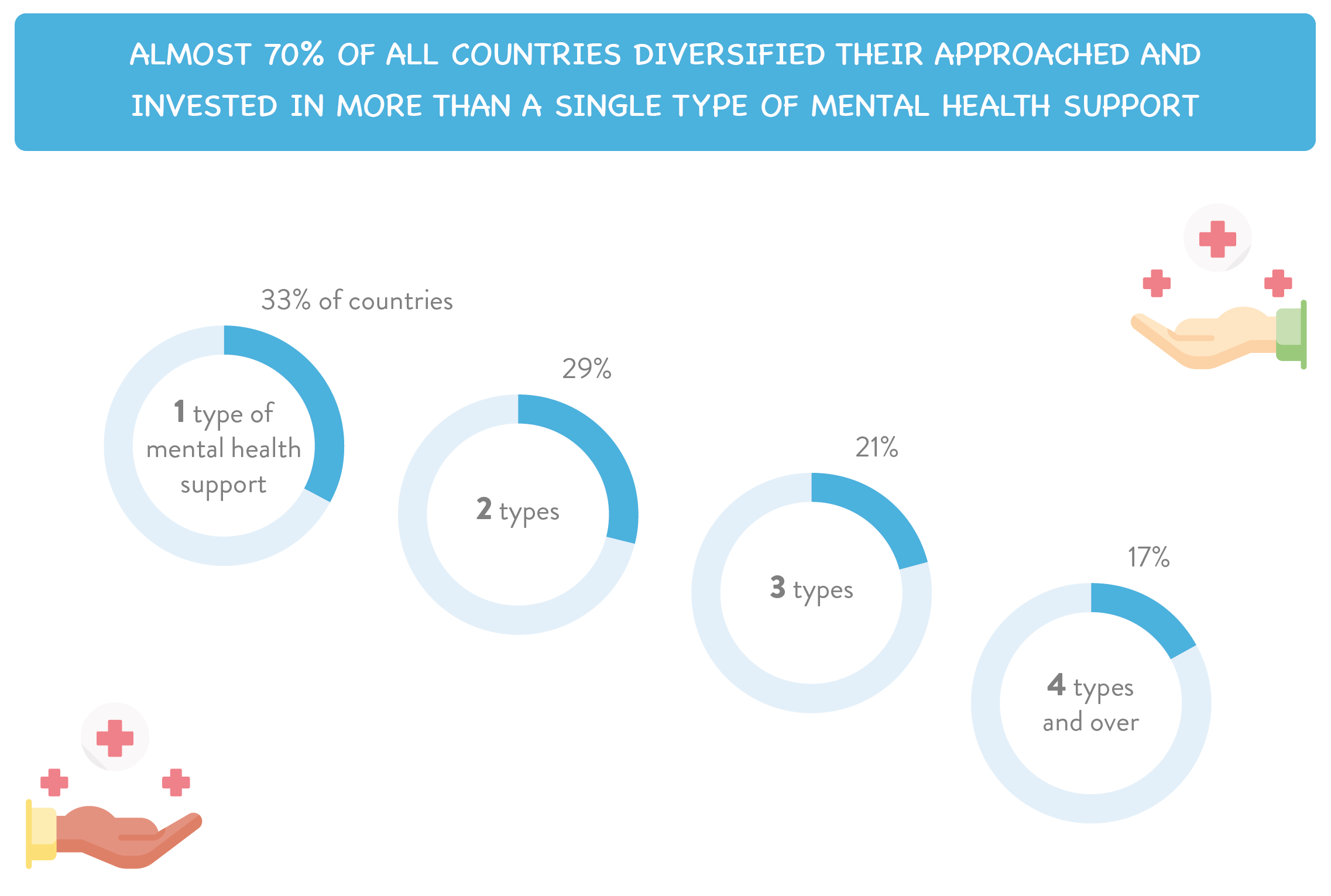
School-based Support
Czech Republic – The Ministry of Education, Youth and Sports solicited applications from schools for funds totalling around 39.8 million CZK in 2022. The funding is intended for prevention programmes including counseling services, crisis intervention teams, activities promoting positive mental health, and informational resources for teachers on mental health support and risky behaviour prevention.
Denmark –A 10-year plan to improve mental health in the country commits a funding increase of 500 million DKK each year starting in 2023. Among the 19 goals in the plan is the development of teacher training tools for early mental health intervention in primary schools to recognise and understand early symptoms and emerging mental health issues in children.
England –10 million GBP was allocated in 2022 (an increase of 7 million GBP) to schools, including colleges and universities, through grants to expand training for senior mental health leads who support the mental well-being of students – including making sure they find appropriate services.
Luxembourg – The Youth Pact 2022-2025 takes a ‘whole school’ approach – combining psychological, sociological, and educational areas of focus. This includes promoting better well-being in secondary schools through actions such as providing better and healthier lunches, socio-emotional skills development, and ongoing well-being and mental health training.
New Zealand – 12.5 million NZD were allocated in the 2022 budget to extend school-based health services over four years to improve health equity for students with greater needs, and for the prevention of more serious mental health issues.
Northern Ireland – Support for school-based initiatives outlined by the Executive includes:
- 5 million GBP in additional funds to extend the Department of Education’s Wellbeing Fund into 2022, giving educational institutions the flexibility to either boost current mental health and well-being programmes or implement new ones with a focus on Covid-19 impacts.
- The creation of an assigned student mental health resource across tertiary education institutions, to be delivered in 2022-23 as part of the Department of Health’s 10-year Mental Health Strategy (estimated 1.2 billion GBP between 2021-2031).
Norway –The government has allocated funds to several areas of youth mental health in 2023 to create more easily-accessible treatment including a 45 million NOK investment, part of which will be directed at strengthening school health services.
Scotland – A three-year action plan launched in September 2022 to address suicide as part of a ‘whole school’ approach includes actions specifically focused on children and young people in school-based settings:
- Age-appropriate curriculum on understanding mental health, including suicide prevention and self-harm.
- Ensuring educational staff members have the proper skills to effectively and proactively respond to signs of suicide.
- Incorporating suicide prevention into pre-registration training for professionals such as teaching staff and youth workers.
United States – The White House announced a series of investments in 2022 to expand mental health services in schools as part of the multi-billion-dollar ‘Bipartisan Safer communities Act’. This includes two grants of 140 million USD each to help schools hire more mental health staff and incentivise professional pathways into school-based mental health services. Other initiatives receiving millions of dollars in funding include the Department of Education’s ‘Full-Service Community Schools Program’ and ‘Project Prevent’.
Wales – Actions for school-based support introduced in 2022 include:
- Increased funding for the country’s ‘whole school’ approach to mental health and well-being, totalling 12.2 million GBP in 2022-23 (up from 5 million GBP at the start of the pandemic), with mental health support for young children and training for support staff in schools and 1.45 million GBP in new funding for well-being support within Pupil Referral Units.
- A commitment in the Children and Young People’s Plan for 2022-23 to further support the “In-Reach” programme in primary and secondary schools after a three-year pilot.
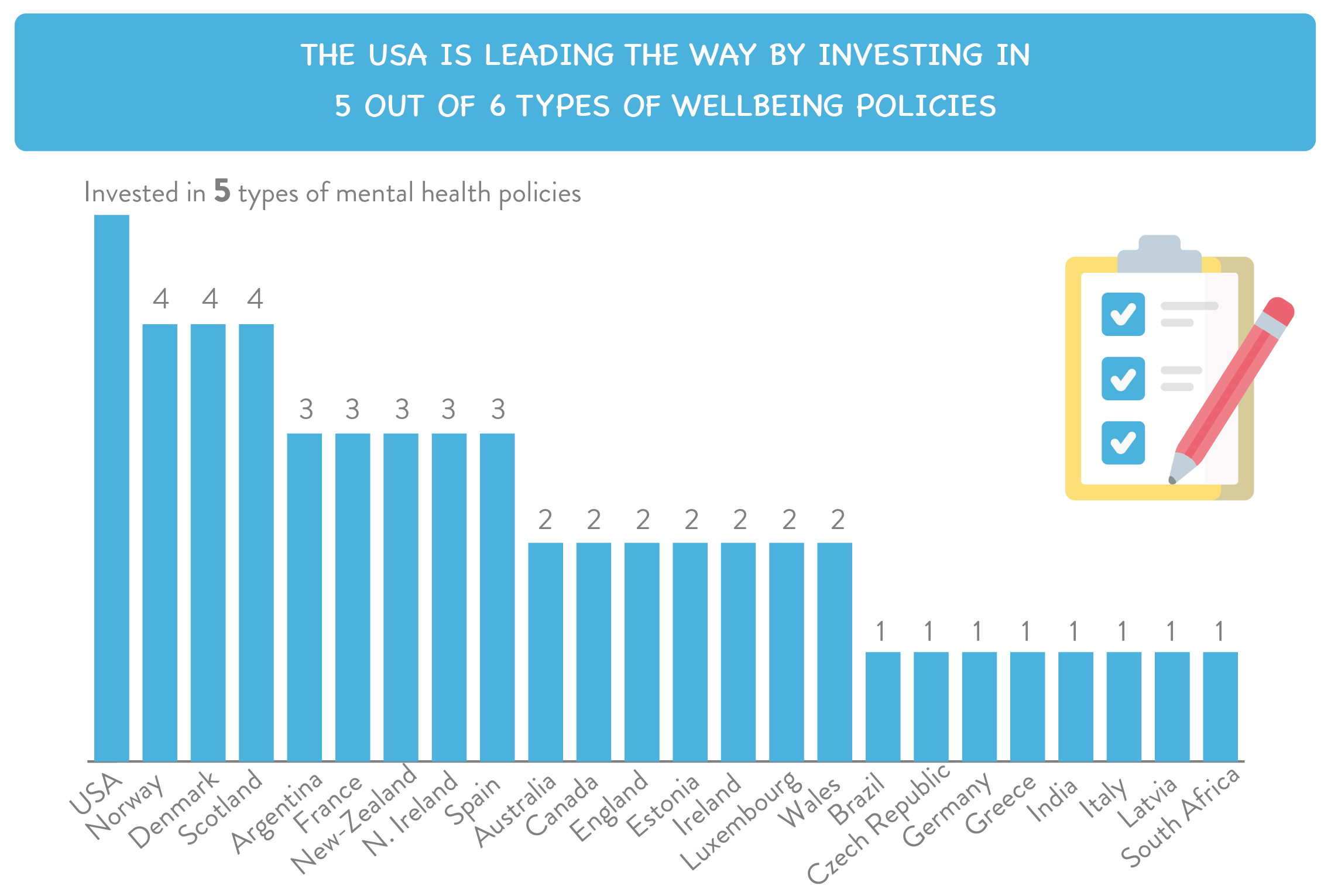
Community-based Support
Argentina – A comprehensive National Mental Health Strategy announced in 2022 includes several community-based interventions such as the creation of the ‘Entre varios en barrios’ programme to bring health professionals closer to communities in need and strengthen overall community networks. Additionally, the health minister signed a resolution in August 2022 to incorporate a new multi-professional specialty diploma in Community Mental Health which is part of a wider interdisciplinary structure intended to connect different areas of expertise providing alternative forms of care to hospitalisation.
Canada – The Canadian government has invested 100 million CAD intended to support mental health projects in populations disproportionately impacted by the pandemic. Of that, 447,000 CAD was designated in November 2022 for a community services centre in the Ottawa area focusing on community-based mental health for disadvantaged children and young people.
Ireland – The 2022 budget in Ireland poured nearly 1.15 billion EUR into the HSE for mental health, much of which is specifically devoted to addressing youth mental health after the pandemic. This includes 10 million EUR to boost existing initiatives to help children and young people access support services and another 10 million EUR one-off investment for specialist services and community support. In conjunction, there is also significant funding to expand community mental health staff, particularly those who work with children and adolescents.
Latvia – The Ministry for Education and Science provided an extensive training programme over a period of four months between October 2022 and January 2023 for government and NGO employees who work with young people. The training course was intended to develop and improve skills in youth workers to assist young people facing mental health issues as well as discrimination, violence, or cultural differences.
Luxembourg – The Youth Pact 2022-2025 expands training and development for youth workers to promote well-being through specific training courses in sports activities, life skills, social media and digital literacy, as well as certified courses on socio-educational youth work through the University of Luxembourg.
New Zealand – The 2022 budget directed 27.5 million NZD for more intensive community-based services, which include community crisis teams and peer-led support. An additional 101.5 million NZD was split between two initiatives supporting mental well-being for children and young people. That includes 89 million NZD over four years dedicated to expanding the Mana Ake programme and 12 million NZD to continue the Piki pilot programme based in Wellington.
Norway – The government has allocated 20 million NOK to fund outreach work in local municipalities with the specific aim of earlier identification of youth mental health issues and substance abuse.
Scotland – The three-year suicide prevention plan includes learning efforts to test new, tailored approaches for outreach and support to reach communities with heightened suicide risk. The plan also calls for providing information on suicide in public community spaces as well as engaging multiple agencies, including community-based organisations, to work in tandem in providing a range of access points for individuals in need of support.
United States – Additional funding from the Bipartisan Safer Communities Act is being divided between a range of community-based mental health initiatives including the expansion of community mental health services, mental health response training for community members and first responders, and after-school and summer programmes for students through 21st Century Community Learning Centers.
Wales – An additional 5.4 million GBP in the 2021-22 budget was dedicated to improving child and adolescent mental health services (CAMHS) with specific funding targeting community-based services for young people.
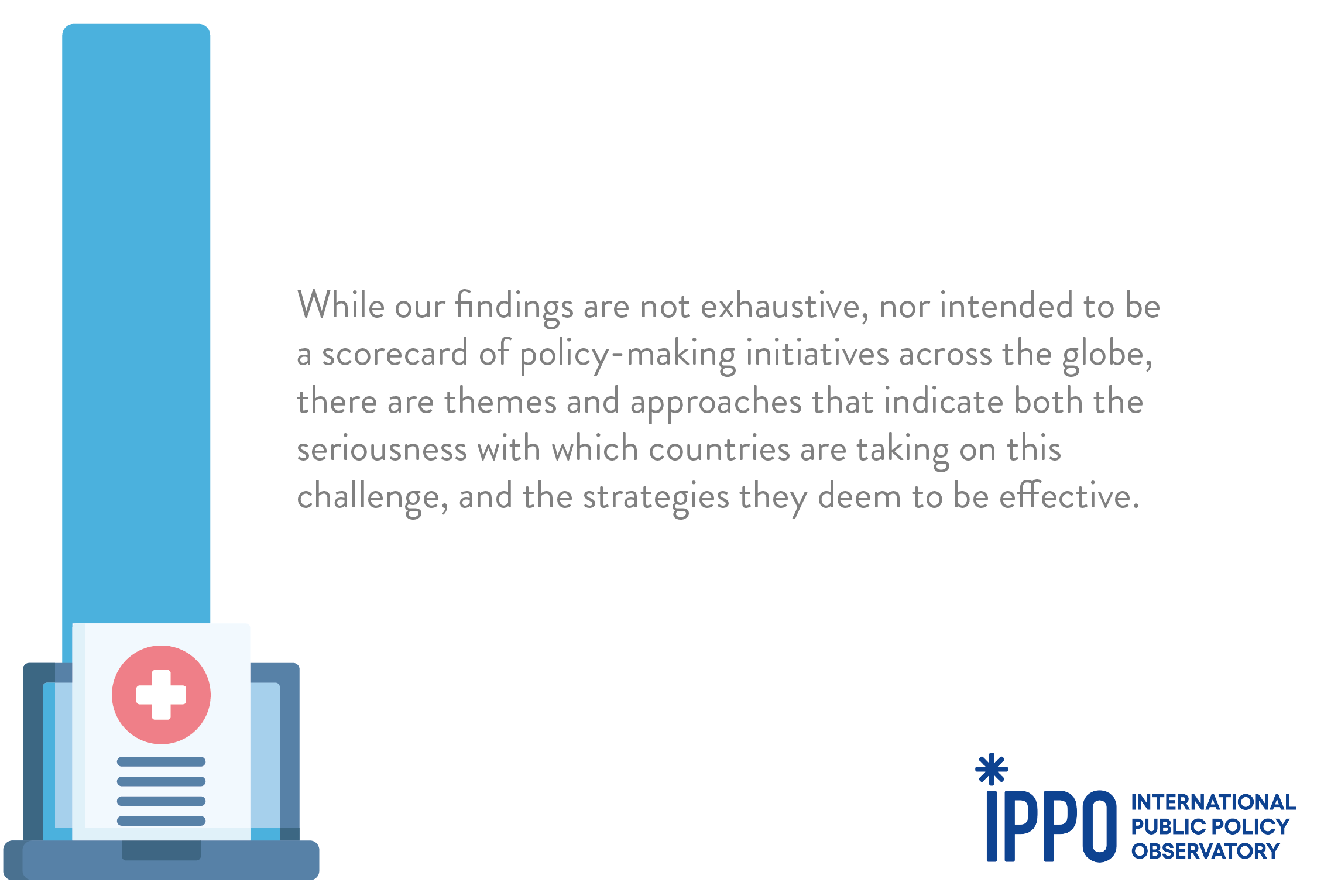
Digital or Telehealth Resources
Argentina – The government’s 2022 National Mental Health Strategy includes the creation of a free, 24-hour helpline for mental health emergencies as well as additional training and expanded access to mental health care through other telehealth services.
Australia – Telehealth services for mental health treatment that were temporarily introduced during the pandemic were made permanent in January 2022 to allow citizens better access to remote options. The services are provided by the government via Medicare subsidies.
Canada – As part of its larger investments to address the increased demand for distress centres in Canada, the government announced in August 2022 that 150,000 CAD in funding would support Tel-Aide Montreal for its crisis line to hire more listeners and give them additional training.
India – A free national ‘tele-mental health’ service was launched as part of the 2022-23 budget to expand access to citizens, with 23 centres offering support at all hours offered in multiple languages.
Ireland – A portion of the country’s nearly 1.15 billion EUR investment in mental health was dedicated to two tele-hubs for children and adolescent mental health services (CAMHS). 1 million EUR will also help provide free talking therapy sessions through MyMind, which offers both face-to-face and virtual talking therapy and can be accessed by under-18s with parental supervision.
Northern Ireland – The 10-year Mental Health Strategy outlined preliminary plans in 2022-23 to develop and launch a comprehensive digital resource for mental health services.
Norway – Funding to enhance and expand digital self-help resources for children includes an investment of 8.5 million NOK to help continue existing work by organisations such as Digi-Ung and Ungdata Junior, which focus on youth mental health and well-being, and 3 million NOK aimed at further development of digital resources.
Scotland – The three-year suicide prevention plan aims to create a single, go-to digital portal with suicide prevention resources, information, and self-management advice that can also link users to other resources.
Spain – The government introduced its Mental Health Action Plan 2022-2024, which devotes 100 million EUR over three years to a range of initiatives to improve mental health care. Among them is a free, 24-hour suicide helpline with trained experts to assist distressed callers and connect them to emergency services in different communities.
United States – The White House allocated 150 million USD in 2022 as part of the Bipartisan Safer Communities Act to help implement a free, 24-hour helpline for mental health distress and suicidal crisis.
General Mental Health Funding or Expansion of Services
Argentina – The 2022 National Mental Health Strategy increases overall funding for mental health treatment by 4 billion ARS, with allocations to urgent care units for mental health care in hospitals, specific assistance for youth and other vulnerable populations, and the opening of a new hospital building for child and adolescent mental health services.
Brazil – The Brazilian Health Ministry introduced a temporary financial aid package in 2022 for state and city authorities to expand their mental health services for children and adolescents. The investments were directed specifically to help implement multi-professional care teams, purchase new equipment, expand outpatient clinics and hospitals, and modernize the Centers for Psychosocial Care for Children and Youth.
Denmark – The 10-year plan approved by the Danish government in 2022 includes a range of targeted measures focused on children and young people to make mental health care more accessible to them, improve quality, and reduce average waiting times for treatment.
Estonia – 4.7 million EUR in additional funding within the 2023 budget brought the total amount for mental health services to 7 million EUR. Portions of that will be dedicated to expanding mental health support through local mental health services and community therapists, as well as increased help for children in need.
France – President Emanuel Macron committed to increasing the capacity of the mental health sector through the creation of an additional 800 mental health care jobs in 2022.
New Zealand – The 2022 Budget invests 100 million NZD over four years to trial a range of new approaches for specialist mental health and addiction services – of which 18 million NZD will be specifically dedicated to boosting child and adolescent mental health and another 10 million NZD to build the overall capacity of the specialist services workforce.
Northern Ireland – The Health Minister announced plans in 2022 to create a new Regional Mental Health Service to deliver locally-based support and also incorporate the community and voluntary sector. The Executive’s broader Mental Health Strategy specified additional aims in 2022-23 such as increasing funding for child and adolescent mental health (CAMHS) to 10% of the adult mental health budget and expanding overall access including through additional therapy hubs.
Spain – The Mental Health Action Plan 2022-2024 includes a range of measures focused on the prevention and early detection of mental health issues – with particular attention on young people. This includes forming a multidisciplinary group of experts to develop ways to promote child and adolescent mental health, strengthening mental health staff resources, and creating a new professional specialty of Child and Adolescent Psychiatry for doctors to pursue.
United States – Provisions within the Bipartisan Safer Communities Act include 80 million USD in funding for better access to children’s mental health services through pediatric primary care, emergency units, and within schools, as well as 60 million USD for additional training in child and adolescent mental health issues for primary care residents.
Research for Future Policymaking
Denmark – The government’s 10-year mental health plan includes funding of 100 million DKK in 2023 to build a framework for new research into mental health prevention and treatment.
England –In 2022, the UK government began collecting evidence to help inform the development of a 10-year plan for mental health and wellbeing. The survey, which was circulated to groups including children and young people, asks for input on how mental health treatment and prevention can be improved.
Estonia – The Ministry of Social Affairs presented the results of a national mental health study in 2022 that found young adults in Estonia to be at ‘significantly higher risk’ of mental health issues. The longitudinal study was conducted among Estonians aged 15 and older between 2021 and 2022 to offer a comprehensive assessment to better understand the country’s mental health needs in relation to the pandemic.
France – President Emanuel Macron announced 80 million EUR to fund new research on mental health in 2022. A few of the key concerns the government hopes to shed light on include ways to improve mental health services in light of growing demand, addressing healthcare worker shortages and burnout, and expanding general telehealth services as accessible treatment options.
Germany – The Federal Ministry of Health has been researching the impacts of the pandemic on children and adolescent health as part of a study between December 2021 and May 2023. The nationwide survey, KIDA, will include collected information on mental health and well-being for children between the ages of 3 and 17 years.
South Africa – Media outlets reported in 2022 that South Africa’s Department of Health has planned to conduct new research into the country’s mental health system and how it addresses mental health problems in young people which will inform policymaking to improve mental health services.
Raising Awareness or Reducing Stigma
Denmark – Under the 10-year mental health plan, the Danish government is devoting 28.4 million DKK over four years to mental health information and de-stigmatisation campaigns.
Greece – In November 2022, more than 200 young people called for greater inclusion in developing mental health policies during a multi-day programme in Athens commemorating Mental Health Week. The programme was held jointly by the Greek government and the WHO/Europe with specific aims of promoting well-being and raising awareness of mental health stigma.
Norway – A pilot for a nationwide awareness campaign called ‘ABC For Good Mental Health’ puts a spotlight on positive mental health behaviours by focussing on active involvement and social belonging. The government aims to make mental health more visible in much the same way that campaigns to discourage smoking or promote exercise and healthy eating have previously done.
Scotland – Within the government’s three-year action plan for suicide prevention are efforts to develop a programme that includes anti-stigma campaigns with a focus on workplace stigma.
Spain – Through its Mental Health Action Plan 2022-2024, The Ministry of Health intends to finance a series of campaigns to promote mental well-being and fight stigmas related to mental health issues.
United States – 240 million USD has been dedicated through the Bipartisan Safter Communities Act for programmes that raise awareness of mental health services for children and young people.
Rebates or Subsidies for Treatment
Australia – As part of the Better Access Initiative, 10 additional Medicare-subsidised therapy sessions were made available to citizens through the end of 2022 in addition to the 10 sessions already provided annually. An independent evaluation published by the government in December 2022 recommended the additional 10 sessions become permanent for patients with complex mental health issues.
France – President Emanuel Macron announced that starting in 2022 the country’s public health system would reimburse patients for therapy – up to 40 EUR for an initial consultation and up to 30 EUR for additional sessions.
Italy – Starting in July 2022, the government began accepting citizen applications for a ‘psychological bonus’ to help cover the cost of mental health treatment. The payments are based on household income status with a maximum payment of 600 EUR per person.
